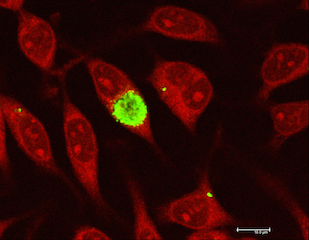What is your scientific background?
I studied undergraduate Bachelor of Science at The University of Queensland in Brisbane, Australia. I intended to study for Medicine graduate entry all throughout high school but when I got to university the amazing lecturers and professors in virology and microbiology inspired me that infectious disease research was where my heart really wanted to be! So I never applied for Medicine and instead I went on to do Honours and my Ph.D. in microbiology also at The University of Queensland. I was very fortunate to do a Postdoctoral Research Position overseas on infectious diseases at The University of York in the UK. It was an amazing experience to work overseas and in beautiful Yorkshire. I came back to Australia to various research positions and fellowships at the Queensland University of Technology before becoming a Faculty member there. In 2015 I took up a very exciting opportunity at the University of Technology Sydney where I get to continue my research on Chlamydia and also get to continue to develop fun learning activities.

Why did you choose to become a scientist?
I was so excited by trying to understand how tiny infectious diseases do what they do so well and how important they are for human health. This interest in understanding how they work still drives me every day to go to work. There are lots of other great things about being a scientist, we get to interact a lot internationally to share our knowledge and solve problems and I love to travel so this is lucky!
I also love to see that moment in lab or class when a student gets a new concept or gets a new skill. I think it is exciting to think of all the careers and places the students I have taught and the members of my research team have ahead of them. I think these are both reasons why I love being a scientist.
During your career, have you been specifically mentored or supported by someone?
I have been very lucky to have many mentors over the years who have impacted on my career. My advisors and supervisors and mentors in my work places have always been a huge help. Especially Professor Peter Timms, now at the University of Sunshine Coast, who tries to foster people to find their own strengths and use those to make their best career path. I have also been lucky to be in a formal mentoring relationship with Professor Jenny Martin (GRIDD, Griffith University) where we have talked about careers and the challenges especially for Women in STEMM over the years. Mentoring and even long distance mentoring (following someone’s career from afar) has made a huge difference to my career decisions (both big and small things). Mentors that are on the same wavelength can also be great fun, you can share things that are hard to share anywhere else, including the silly mistakes as well as the tough moments!

Is it hard to manage both career and private life? How do you manage both?
It is challenging in a busy career that does involve travel. However, there are lots of jobs that involve busy work hours and travel. The good thing about my job is now that I am no longer in the lab a lot of what I can do can be done on my laptop anywhere and I take advantage of this whenever I can. My Husband and extended family work together with me to ensure our family operates well even when I am traveling or busy. Our kids are definitely getting raised by a village and I am very lucky that my support network is available and willing to help out with our family life. I actually believe that this mix of care (in addition to day care) is a really great experience for our kids as they have lots of love around them and lots of different experiences. So yes, it is busy but fun and dynamic and I work really hard to be honest with myself that I am being a great role model for my kids and they benefit from their life.
In your opinion, which changes, if any, are needed in the scientific system to be more attractive to female scientists and possible future scientists?
There are a lot of things that need to change. Science is fun, exciting and dynamic, ideally suited to a broad range of people from different backgrounds and so we need to make sure that our funding systems, rewards systems become more broadly inclusive. I think we will have even more exciting advances and breakthroughs if we can embrace a broader science community, especially women and minority groups. Funding, awards, and fellowships all need to have minimum quotas for women and minorities I think as we have tried to make changes and it just isn’t happening fast enough! So quotas are the way to go I think!
You can find Willa on Twitter and Instagram as @willaonthego, and contact her via email: Wilhelmina.Huston@uts.edu.au!




